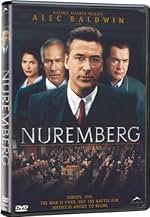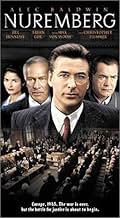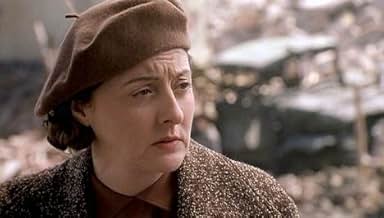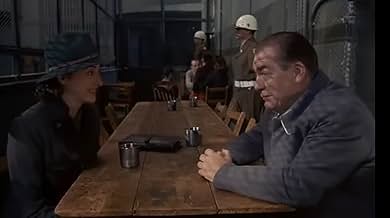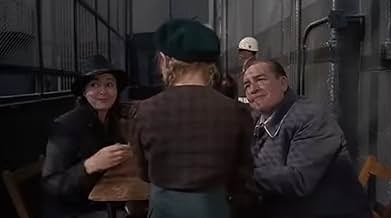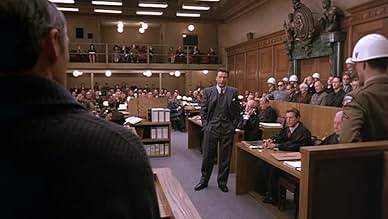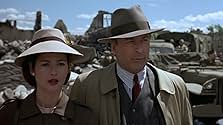The dramatized account of the war crime trials following the defeat of Nazi Germany in World War II.The dramatized account of the war crime trials following the defeat of Nazi Germany in World War II.The dramatized account of the war crime trials following the defeat of Nazi Germany in World War II.
- Won 2 Primetime Emmys
- 10 wins & 33 nominations total
Browse episodes
Featured reviews
Magnificent film based on actual events with top-notch performances throughout proceeded by a decent star cast and specially by Baldwin , Cox , Plummer , Sydow , Heyerdahl and Len Cariou as supreme judge who presides over the trials , among others . A stimulating portrayal of the Nuremberg trials in which members of the German authorities were brought to response their crimes in the immediate post-war period .
Supreme court Justice , judge Robert H Jackson (Alec Baldwin) is asked to head up the prosecution and he decides to try a representative sample of third Reich leaders , including Hitler's 2º man Hermann Goering (Brian Cox) . The movie initiates with scenes of Núremberg , Germany , 1948 , the destruction of the war is clear everywhere , there Robert is driven through the ruined buildings . The court is formed by three judges to preside the trial against the Nazi chiefs for their complicity in Third Reich . As Robert Jackson in charge of Allied prosecution Nazi war who must resist political pressures and speeches against him , being helped by his assistant Elsie Douglas (Jill Hennessy) . In its opening declaration , the prosecution calls these defendants to account not for violation of due process or other constitutional violations but for killings , tortures , and cruelties committed during WWII . Considers to what extent an individual may be held accountable for actions committed of a superior officer . The accuser statements that the accused cannot claim ignorance that they should have known better for their high position and knowledge . And defenders argue the disobedience to the Fuehrer would have been choice between patriotism and treason for the justices with the subsequent firing squad . Finally the defending councillors explain that not only are the high staff on trial , so are the German people . They claim that the extremists are responsible , not the defendants . They say that very few Germans knew what was going on . Defense lawyers give us the uneasy feeling that the German people never really came to terms with their innocence or guilty . They claimed that the defendants stayed in their positions to keep things from getting worse . One of the more dramatic portions of the film centers around Prosecutor Robert Jackson submitted documents by which the judges and prosecutors had sent thousands to their deaths . A film was shown , a short-documentary is based on real events by means of photographs and stock-footage . As appears work camps are transformed into extermination centers to implement the policy of genocide thought at the Wannsee Conference . At the concentration camps was some minor industrial activity linked to the war effort but the main work was the execution of inmates . Millions of prisoners died in the concentration camps through mistreatment , disease, starvation, and overwork, or were executed as unfit for labor. More than six million Jews died in them, usually in gas chambers, although many were killed in mass shootings and by other means . As the documentary showed a gas chamber at Dachau , but it is a mistake because of it was never used, prisoners died from mistreatment or from execution by means other than gas . The archival footage shows tattooed skin , but Buchenwald prisoners with unusual tattoos were killed , then their skin was preserved for the tattoo collection of convicted war criminal Ilse Koch .
This is a graphic and thought-provoking account of the Nuremberg trials in which a group of high-level hierarchy are on trial , being judged in the immediate post-war period ; and subsequently brought to book by Joseph E. Persico , as this picture is based on his novel titled ¨Núremberg : Infamy on trial¨ . This consuming as well as provoking retelling contains some interesting trial scenes that generally work but there's also the needless byplay of a love story between prosecutor attorney Robert/Baldwin and his secretary/Hennessy . Prosecutor Robert H. Jackson is perfectly played by Alec Baldwin , he gives a very good acting for his impassioned portrayal of the accusation against the nasty Nazis . And also superb : Herbert Knaup as Albert Speer , Christopher Heyerdahl as Ernst Kaltenbrunner , Colm Feore as Rudolf Höß , Fournier as Reichsminister Alfred Rosenberg , Cloutier as admiral Karl Dönitz , Frank Moore as Hans Frank , René Gagnon as Reichsminister Arthur Seyß-Inquart , Benoît Girard as Joachim Von Ribbentrop , Dennis St John as Franz Von Papen , LaFortune as Rudolf Hess , Sam Stone as Julius Streicher and , of course , the always chilling Brian Cox . This deeply moving and powerful film was well -but not overly compelling- directed by Yves Simoneau . Rating : Good , better than average .
Supreme court Justice , judge Robert H Jackson (Alec Baldwin) is asked to head up the prosecution and he decides to try a representative sample of third Reich leaders , including Hitler's 2º man Hermann Goering (Brian Cox) . The movie initiates with scenes of Núremberg , Germany , 1948 , the destruction of the war is clear everywhere , there Robert is driven through the ruined buildings . The court is formed by three judges to preside the trial against the Nazi chiefs for their complicity in Third Reich . As Robert Jackson in charge of Allied prosecution Nazi war who must resist political pressures and speeches against him , being helped by his assistant Elsie Douglas (Jill Hennessy) . In its opening declaration , the prosecution calls these defendants to account not for violation of due process or other constitutional violations but for killings , tortures , and cruelties committed during WWII . Considers to what extent an individual may be held accountable for actions committed of a superior officer . The accuser statements that the accused cannot claim ignorance that they should have known better for their high position and knowledge . And defenders argue the disobedience to the Fuehrer would have been choice between patriotism and treason for the justices with the subsequent firing squad . Finally the defending councillors explain that not only are the high staff on trial , so are the German people . They claim that the extremists are responsible , not the defendants . They say that very few Germans knew what was going on . Defense lawyers give us the uneasy feeling that the German people never really came to terms with their innocence or guilty . They claimed that the defendants stayed in their positions to keep things from getting worse . One of the more dramatic portions of the film centers around Prosecutor Robert Jackson submitted documents by which the judges and prosecutors had sent thousands to their deaths . A film was shown , a short-documentary is based on real events by means of photographs and stock-footage . As appears work camps are transformed into extermination centers to implement the policy of genocide thought at the Wannsee Conference . At the concentration camps was some minor industrial activity linked to the war effort but the main work was the execution of inmates . Millions of prisoners died in the concentration camps through mistreatment , disease, starvation, and overwork, or were executed as unfit for labor. More than six million Jews died in them, usually in gas chambers, although many were killed in mass shootings and by other means . As the documentary showed a gas chamber at Dachau , but it is a mistake because of it was never used, prisoners died from mistreatment or from execution by means other than gas . The archival footage shows tattooed skin , but Buchenwald prisoners with unusual tattoos were killed , then their skin was preserved for the tattoo collection of convicted war criminal Ilse Koch .
This is a graphic and thought-provoking account of the Nuremberg trials in which a group of high-level hierarchy are on trial , being judged in the immediate post-war period ; and subsequently brought to book by Joseph E. Persico , as this picture is based on his novel titled ¨Núremberg : Infamy on trial¨ . This consuming as well as provoking retelling contains some interesting trial scenes that generally work but there's also the needless byplay of a love story between prosecutor attorney Robert/Baldwin and his secretary/Hennessy . Prosecutor Robert H. Jackson is perfectly played by Alec Baldwin , he gives a very good acting for his impassioned portrayal of the accusation against the nasty Nazis . And also superb : Herbert Knaup as Albert Speer , Christopher Heyerdahl as Ernst Kaltenbrunner , Colm Feore as Rudolf Höß , Fournier as Reichsminister Alfred Rosenberg , Cloutier as admiral Karl Dönitz , Frank Moore as Hans Frank , René Gagnon as Reichsminister Arthur Seyß-Inquart , Benoît Girard as Joachim Von Ribbentrop , Dennis St John as Franz Von Papen , LaFortune as Rudolf Hess , Sam Stone as Julius Streicher and , of course , the always chilling Brian Cox . This deeply moving and powerful film was well -but not overly compelling- directed by Yves Simoneau . Rating : Good , better than average .
Quite a few reviewers seem to be taken by the historicity of this movie. It's true that many of the details are correct - but it is also true that many others are wildly incorrect. The most egregious one is the romantic liaison between Justice Jackson and his assistant. I guess that the producers introduced the romantic element for the sake of a wider appeal, but the fact is that, in light of the actual events, this looks ridiculous. Which is a shame, for the movie would have been far more valuable without that silliness. It's mostly because of this that I don't think that it deserves more than 5 points. The bright sides are Brian Cox's and Michael Ironside's performances, and also, but to a lesser extent, Christopher Plummer's and Matt Craven's. Alec Baldwin delivers the same kind of underwhelming performance that he usually does, and Jill Hennessy does whatever she can with her inane and fictitious part.
In summary, it could have been a good movie, but it is just a decent one.
In summary, it could have been a good movie, but it is just a decent one.
Hidden inside this purported battle between surviving top Nazi Hermann Goering and American prosecutor Judge Robert Jackson is, I think, the adaptation the writer probably wanted to do - the story of psychologist G. M. Gilbert and his backstage verbal tusslings with men who either refused to acknowledge any guilt (Goering, Streicher) or conversely were overflowing with it (Frank, Speer).
When you see Alec Baldwin appear a second time in the credits, as Executive Producer, you feel that Nuremberg was probably conceived as a vanity project for him. Fortunately it is quite easy to let the early scenes of the Court's setup just wash over you, and of course Jill Hennessey is always easy on the eyes. Much of the first half of the first episode is more or less soap opera. Jackson has to persuade Judge Biddle to go to Nuremberg, then to relinquish the Presidency of the court to the British. The bantering relationship with his secretary (Hennessey) serves as a prelude to their becoming lovers during their time in Germany.
At this point Hermann Goering appears (the great Brian Cox on top form), totally dominating the trial, totally dominating this mini-series, and your attention is grasped and held. Cox almost wipes Baldwin off the screen. Unfortunately it's very hard not to gain a great deal of sympathy for Goering, particularly when he is with his family, or in the heart-to-heart chats with his G. I. prison guard, Tex. We see Goering as he undoubtedly saw himself, but in reality he wasn't like that at all. The Nuremberg trial and the general travails of imprisonment were an excellent opportunity for him to smarten himself up: prior to his arrest he had become a dissolute and overweight drug addict. Unfortunately no sign of this weakness of character was carried over into the script, leaving an impression of Goering as a noble, principled man - irrespective of whether you agreed with his principles.
Also very watchable was Matt Craven in the role of Gilbert the aforementioned psychologist, and Christopher Plummer as British prosecutor David Maxwell-Fyfe (although the real Maxwell-Fyfe was the younger prosecutor, not an elder mentor as depicted here). Particularly gratifying is the scene in which Maxwell-Fyfe tells Jackson that "your documentary approach is legally impeccable - but as drama it's absolutely stultifying" - which might stand as an apt description of Baldwin's part in this series.
A last little curiosity, and not to make any personal remarks about Herbert Knaup, but I did find it strange that they cast Knaup, a slightly odd-looking actor, to play Albert Speer, by fairly common consent the handsomest and most photogenic of all the Nazi leaders, particularly as Speer was portrayed here in a sympathetic light. Other than Knaup, many of the actors were very close in looks to their real-life counterparts, most notably Roc LaFortune as Rudolf Hess, almost a living double.
When you see Alec Baldwin appear a second time in the credits, as Executive Producer, you feel that Nuremberg was probably conceived as a vanity project for him. Fortunately it is quite easy to let the early scenes of the Court's setup just wash over you, and of course Jill Hennessey is always easy on the eyes. Much of the first half of the first episode is more or less soap opera. Jackson has to persuade Judge Biddle to go to Nuremberg, then to relinquish the Presidency of the court to the British. The bantering relationship with his secretary (Hennessey) serves as a prelude to their becoming lovers during their time in Germany.
At this point Hermann Goering appears (the great Brian Cox on top form), totally dominating the trial, totally dominating this mini-series, and your attention is grasped and held. Cox almost wipes Baldwin off the screen. Unfortunately it's very hard not to gain a great deal of sympathy for Goering, particularly when he is with his family, or in the heart-to-heart chats with his G. I. prison guard, Tex. We see Goering as he undoubtedly saw himself, but in reality he wasn't like that at all. The Nuremberg trial and the general travails of imprisonment were an excellent opportunity for him to smarten himself up: prior to his arrest he had become a dissolute and overweight drug addict. Unfortunately no sign of this weakness of character was carried over into the script, leaving an impression of Goering as a noble, principled man - irrespective of whether you agreed with his principles.
Also very watchable was Matt Craven in the role of Gilbert the aforementioned psychologist, and Christopher Plummer as British prosecutor David Maxwell-Fyfe (although the real Maxwell-Fyfe was the younger prosecutor, not an elder mentor as depicted here). Particularly gratifying is the scene in which Maxwell-Fyfe tells Jackson that "your documentary approach is legally impeccable - but as drama it's absolutely stultifying" - which might stand as an apt description of Baldwin's part in this series.
A last little curiosity, and not to make any personal remarks about Herbert Knaup, but I did find it strange that they cast Knaup, a slightly odd-looking actor, to play Albert Speer, by fairly common consent the handsomest and most photogenic of all the Nazi leaders, particularly as Speer was portrayed here in a sympathetic light. Other than Knaup, many of the actors were very close in looks to their real-life counterparts, most notably Roc LaFortune as Rudolf Hess, almost a living double.
Well done, as television movies go. There seems to have been a substantial budget and an awful lot of research behind it. There are times when points and characters are overstated, but it's an improvement over "Judgment at Nuremberg." This film puts the Nazi leaders on trial and finds most of them guilty of crimes against humanity, while others are sentenced to prison. "Judgment at Nuremberg" put the entire nation of Germany on trial, handed the thankless task of defending Germany's role in World War II to Maximilion Schell, and found every German who ever breathed to be guilty of every sin that's ever been committed in the history of humankind. The scriptwriter, Abby Mann, accepted his Academy Award "in the name of all intellectuals everywhere." This modest production fills in many of the blanks that are missing from the public's understanding of the Nuremberg trials. Where, for instance, did the prisoners and staff of the trials find housing in Nuremberg, an ancient city that had been flattened by Allied bombing and in which there were still hundreds of decomposing bodies beneath the rubble? And did all the four major powers -- the US, Britain, France and Russia agree on the format and the procedures? Answer: No, the Russians and the French, who had suffered most under Nazissm, wanted summary executions of all the bigwigs. The subject is dead serious but the program has its quietly amusing moments -- the brash, ugly Russian representative trying to persuade the horrified French representative that he should lace his fine wine with a good belt of vodka. It has the limitations of most commercial productions. The Russian guy really IS ugly, and almost all the Germans are played by men with names like O'Keefe. There are many choker closeups, a technique that befits the small screen.
The Nazi leaders of course are villains of the worst sort but they're shown as humans too. After the surrender, an ebullient Goering, Brian Cox, unexpectedly drives up to an American Air Force base with his wife and child, dismounts from his chauffeur-driven car, and formally hands over his sword to an astounded General Spaatz -- "one airman to another." After being feted publicly, the victors soon round him up and place him in a cell, as had been done with the other prisoners. An American lieutenant, Tex Wheeler, is posted as Goering's personal guard. Scott Gibson gives a convincing performance. Wheelis will play a larger role in Goering's fate later.
Alex Baldwin is Robert H. Jackson, who more or less runs the show. His assistant Jill Hennessy is a fox and the rest of the cast is quite good. There are too many airy conversations about moral superiority and the viewer is urged to want Baldwin to treat Georing on the stand as the despicable, conniving swine he is. Should he? How does the word "disinterested" differ from "uninterested"? The most chilling testimony comes from the Commandant of Auschwitz, who describes the camp's activities precisely and dispassionately -- showing neither indignation or remorse.
Unfortunately, the prosecution insists on presenting not just documentary evidence but witnesses too, in order to deliberately heighten the drama behind the trial. It's pretty sickening, naturally, and to many adults it's repetitive. We know about the medical experiments in which Jews were kept in freezing water until they died. And so we sit through the familiar revolting images of the charred skeleton in the oven, the walking cadavers, the old man praying as he lies on a stretcher, the waxlike naked bodies piled on one another in mounds, the bulldozer shoveling them into the empty pit. I doubt that anyone needs to be REMINDED of what happened. But maybe it's just as well that we go through it all again because I'm not sure how much of this material has faded from our collective memory. One in six English youngsters thought Auschwitz was a World War II theme park, and one in six thought Hitler was a football coach.
And, at that, there are some insights into what has always been a blank at least in my mind. Goering was head of the Luftwaffe. So? What did he have to do with the treatment of the Jews and other devalued minorities? Simple. The experiments that froze subjects to death in ice water were undertaken at his request in order to discover how Luftwaffe crew might best survive if shot down in northern waters. Except for a few, the defendants all seem like unregenerate Nazis. Well, except for Rudolf Hess too, because he was nuts. It may seem like a mistake to have Julius Streicher portrayed as a rabid anti-Semite, pounding the table, ranting against Jews, his features in a cataleptic sneer. But that was the kind of guy he really was. He wasn't a military man but his railing against the Jews amounted to paranoia. He combed the pages of the Talmud and the Old Testament in search of passages that painted Judaism as harsh or cruel, rather like some of us are now doing with the Koran. It's easy.
Some of the prisoners, like Albert Speer, the architect who became Hitler's Armaments Minister, admit their guilt. Others rely on the rationale that they were only following orders. This excuse is always dismissed by civilized people but mistakenly in my opinion.
Not in this case, perhaps, but for "only following orders" substitute "doing what I was expected to do," and we're all guilty, even if the "orders" are sometimes unspoken, in which case they're known as "command pressure" or "peer pressure" or "keeping up with the Joneses." One doubtful ex-Nazi, Hans Frank, puts it this way: "I wanted to keep my job." Suppose, instead of "job", we substitute "public opinion" or "the respect of my community"? From a sociological point of view, the intricacies are myriad.
The Nazi leaders of course are villains of the worst sort but they're shown as humans too. After the surrender, an ebullient Goering, Brian Cox, unexpectedly drives up to an American Air Force base with his wife and child, dismounts from his chauffeur-driven car, and formally hands over his sword to an astounded General Spaatz -- "one airman to another." After being feted publicly, the victors soon round him up and place him in a cell, as had been done with the other prisoners. An American lieutenant, Tex Wheeler, is posted as Goering's personal guard. Scott Gibson gives a convincing performance. Wheelis will play a larger role in Goering's fate later.
Alex Baldwin is Robert H. Jackson, who more or less runs the show. His assistant Jill Hennessy is a fox and the rest of the cast is quite good. There are too many airy conversations about moral superiority and the viewer is urged to want Baldwin to treat Georing on the stand as the despicable, conniving swine he is. Should he? How does the word "disinterested" differ from "uninterested"? The most chilling testimony comes from the Commandant of Auschwitz, who describes the camp's activities precisely and dispassionately -- showing neither indignation or remorse.
Unfortunately, the prosecution insists on presenting not just documentary evidence but witnesses too, in order to deliberately heighten the drama behind the trial. It's pretty sickening, naturally, and to many adults it's repetitive. We know about the medical experiments in which Jews were kept in freezing water until they died. And so we sit through the familiar revolting images of the charred skeleton in the oven, the walking cadavers, the old man praying as he lies on a stretcher, the waxlike naked bodies piled on one another in mounds, the bulldozer shoveling them into the empty pit. I doubt that anyone needs to be REMINDED of what happened. But maybe it's just as well that we go through it all again because I'm not sure how much of this material has faded from our collective memory. One in six English youngsters thought Auschwitz was a World War II theme park, and one in six thought Hitler was a football coach.
And, at that, there are some insights into what has always been a blank at least in my mind. Goering was head of the Luftwaffe. So? What did he have to do with the treatment of the Jews and other devalued minorities? Simple. The experiments that froze subjects to death in ice water were undertaken at his request in order to discover how Luftwaffe crew might best survive if shot down in northern waters. Except for a few, the defendants all seem like unregenerate Nazis. Well, except for Rudolf Hess too, because he was nuts. It may seem like a mistake to have Julius Streicher portrayed as a rabid anti-Semite, pounding the table, ranting against Jews, his features in a cataleptic sneer. But that was the kind of guy he really was. He wasn't a military man but his railing against the Jews amounted to paranoia. He combed the pages of the Talmud and the Old Testament in search of passages that painted Judaism as harsh or cruel, rather like some of us are now doing with the Koran. It's easy.
Some of the prisoners, like Albert Speer, the architect who became Hitler's Armaments Minister, admit their guilt. Others rely on the rationale that they were only following orders. This excuse is always dismissed by civilized people but mistakenly in my opinion.
Not in this case, perhaps, but for "only following orders" substitute "doing what I was expected to do," and we're all guilty, even if the "orders" are sometimes unspoken, in which case they're known as "command pressure" or "peer pressure" or "keeping up with the Joneses." One doubtful ex-Nazi, Hans Frank, puts it this way: "I wanted to keep my job." Suppose, instead of "job", we substitute "public opinion" or "the respect of my community"? From a sociological point of view, the intricacies are myriad.
I have read a few books on the Nuremberg trials, as well as books on The Third Reich in general. Though the portrayals of the defendants were fairly accurate, they were not given the appropriate amount of air-time.I mean, without the defendants, there wouldn't have been a trial. Here's the top 10 things that should have been added (and especially subtracted from the movie.)
10) Should have emphasized the alliances between the defendants. Speer wasn't the only one to stand up to Goering. Von Schirach, Funk, and Fritzsche were all against Goering.
9) Give Defendent #2 Rudolf Hess more that four words.
8) Clarifiy why Hess goes crazy at the end.
7) Make sure the audience knows that Speer's penitence could be him saving his hide.
6) Emphasize that Franks conversion was due to him finding God.
5) Talk about the defendants personal lives, try to explain why they would commit these atrocities.
4) Tell what happened to the defendants who were acquitted or had their sentences carried out at Spandau.
3) They should of had the story include Von Schirach and Von Neurath, the youngest and the oldest defendants, so they would have more of a age perspective to the story.
2)All of the Defendants positions should have been named at least once.
1) The Jackson/Secretary affair probably took at'least a half an hour out of the mini-series, Which could have been dedicated to, I don't know, making sure the audience at least knows the defendant's's names. Besides, I don't now one person who saw that movie who actually liked the couple.
10) Should have emphasized the alliances between the defendants. Speer wasn't the only one to stand up to Goering. Von Schirach, Funk, and Fritzsche were all against Goering.
9) Give Defendent #2 Rudolf Hess more that four words.
8) Clarifiy why Hess goes crazy at the end.
7) Make sure the audience knows that Speer's penitence could be him saving his hide.
6) Emphasize that Franks conversion was due to him finding God.
5) Talk about the defendants personal lives, try to explain why they would commit these atrocities.
4) Tell what happened to the defendants who were acquitted or had their sentences carried out at Spandau.
3) They should of had the story include Von Schirach and Von Neurath, the youngest and the oldest defendants, so they would have more of a age perspective to the story.
2)All of the Defendants positions should have been named at least once.
1) The Jackson/Secretary affair probably took at'least a half an hour out of the mini-series, Which could have been dedicated to, I don't know, making sure the audience at least knows the defendant's's names. Besides, I don't now one person who saw that movie who actually liked the couple.
Did you know
- GoofsAt the end of the trial, Field Marshall Wilhelm Keitel is referred to as "Admiral Keitel."
- Quotes
Reichsmarschall Hermann Wilhelm Göring: One German, a fine man. Two Germans, a bund. Three Germans, a war. One Englishman, an idiot. Two Englishmen, a club. Three Englishmen, an Empire.
- ConnectionsFeatured in The 58th Annual Golden Globe Awards 2001 (2001)
- SoundtracksDeep in the Heart of Texas
Written by June Hershey and Don Swander
Performed by cast
Melody Lane Music c/o Peermusic International
- How many seasons does Nuremberg have?Powered by Alexa
Details
- Release date
- Countries of origin
- Official site
- Languages
- Also known as
- Nürnbergprocessen
- Filming locations
- Production companies
- See more company credits at IMDbPro
- Runtime
- 1h 30m(90 min)
- Color
- Sound mix
- Aspect ratio
- 1.85 : 1
Contribute to this page
Suggest an edit or add missing content



